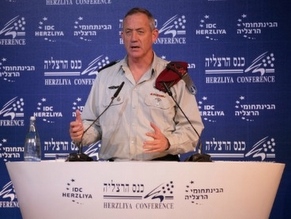|
World Jewish News

IDF Chief of Staff Lt. Gen. Benny Gantz, Feb. 1, 2012. Photo by: Osim Tzilum
|
IDF chief: Iran's nuclear program must continue to be disrupted
02.02.2012, Israel and the World Israel Defense Forces Chief of Staff Lt. Gen. Benny Gantz said on Wednesday that the threats facing Israel have increased and intensified in recent years due to regional instability. He also said that Iran's attempts to acquire nuclear weapons must continue to be disrupted.
Speaking to the Herzliya Conference, Gantz said that Iran's nuclear program is a "global problem and a regional problem".
He added that Iran could cross the nuclear threshold within a year, if it decides to do so.
"There is no doubt that Iran is seeking military nuclear capability," Gantz said.
Gantz said that Gulf states are just as concerned about Iran's nuclear program as Israel is. He added, however, that "we must not forget one basic thing: Israel is the only country in the world which someone is calling for its destruction and which someone is building the tools to do so. This is something that cannot be ignored."
"The world and the region must continue to isolate Iran," Gantz said. "It is correct to continue economic pressure and sanctions, from which we are starting to see signs of achievement and progress in terms of what is going on in Iran. It is correct to act and continue to disrupt processes associated with the development of the Iranian nuclear project and to work to enhance oversight over what is happening."
Gantz said that there must be a strong military option, ready to be used "if and when it is needed".
Gantz estimated that "only the Iranian regime will decide at the end of the day if it will give up on a military nuclear capability. But determined and consistent action will bring [Iran] to this strategic insight."
On other threats facing Israel, Gantz said: "Gaza and Lebanon are some of the largest munitions depots I know. These [weapons] enter from Iran, Syria, and unfortunately even Russia continues to send arms to this day, where in Syria it is not clear who will control and operate them later. The Middle East is the most armed region in the world, and the bad news is that we are the target of these arms. And we need to remember this."
By Gili Cohen
Haaretz.com
|
|
